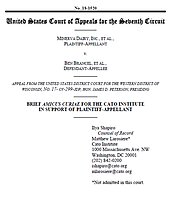Of course, Wisconsin is America’s Dairyland, with many large dairy producers who naturally want to limit their competition. At the behest of these large producers, the state requires every batch of butter sold in the state to be “graded” by a specifically state-licensed grader—all of whom live in Wisconsin, except for a handful in neighboring Illinois—who must taste-test every single batch. Because Minerva’s butter is produced in multiple small batches over the course of each day, the law would effectively require the dairy to keep a licensed tester on-site at all times, which is cost-prohibitive. The state admits that the grading scheme has nothing to do with public health or nutrition, but claims that its grades—based largely on taste—inform consumers.
The fact that Wisconsin is trying to shape the taste of butter isn’t even the most absurd part of this case. The criteria used to grade the butter are a ludicrous mad-lib of meaningless jargon not even the state’s experts understand. The law purports to identify such flavor characteristics as “flat,” “ragged-boring,” and “utensil.” (All commonplace terms spoken by consumers in dairy aisles across the nation, certainly.) This terminology hearkens to a freshman—not even sophomore—term paper on the semiotics of postmodern agrarian literature. To claim that a grade calculated with reference to meaningless nonsense serves the purpose of informing anyone illustrates the danger inherent in judges’ dutifully deferring to government rationales for silly laws that burden people who are just trying to make an honest living.
Our friends at the Pacific Legal Foundation represent Minerva in a lawsuit that challenges the butter-grading law on grounds that it burdens interstate commerce in violation of the Commerce Clause, and also hurts small dairies’ Fourteenth Amendment rights to due process and equal protection of the laws. Minerva lost at the district court when the judge applied a toothless “rational basis” test to the law in question, giving little weight to the serious concerns described above. Must the judiciary rubber-stamp every legislative folly?
Because laws that abrogate constitutional rights warrant meaningful judicial oversight, Cato filed an amicus brief in Minerva Dairy v. Brancel to the U.S. Court of Appeals for the Seventh Circuit. Wisconsin’s law directly burdens the right to participate in the state’s butter market, and thus their economic liberty, for no sane or rational reason. There are simply no benefits to consumers that come from forcing producers like Minerva to pay considerable sums to have an irrational process deposit a random letter on product packaging. It curdles the mind to argue otherwise.


